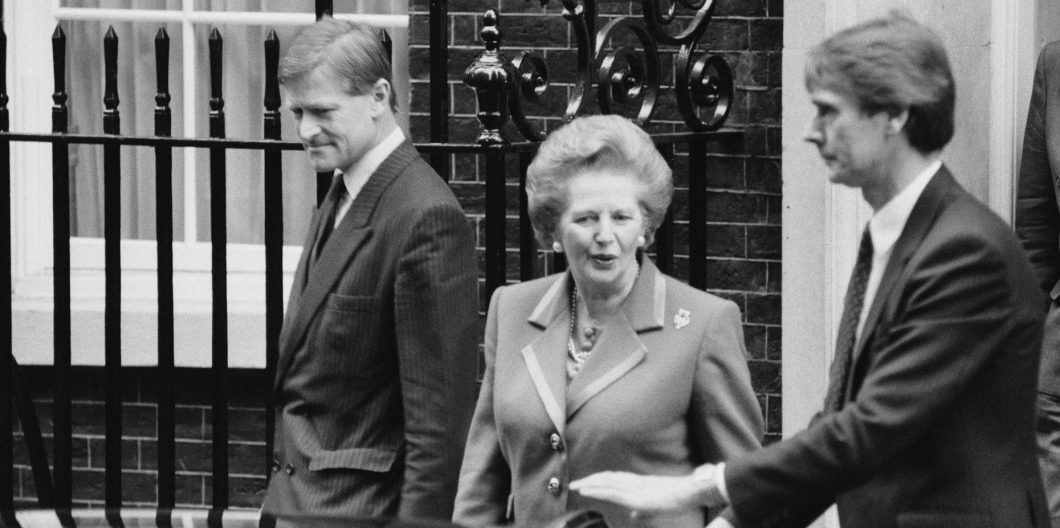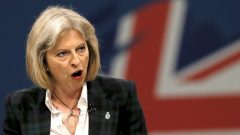The Iron Lady Alone
“Nothing lasts forever. Even the most glittering and long-lasting reign must come to an end sometime.” These are the words of Francis Urquart, the scheming protagonist of the original British House of Cards, as he tips over the photograph of Margaret Thatcher on his desk at the beginning of the series. Herself Alone, the last volume of Charles Moore’s splendid and definitive biography of Margaret Thatcher, is the story of that ending. It has the arc of a double tragedy, both personal and social. The very strengths that allowed her to transform a sclerotic, declining nation into a vibrant modern economy—single mindedness, self-confidence, and willingness to stand alone—brought her down as these qualities led to hubris in the final years of her premiership. And the very success of her policies allowed the Conservative Party to dispense with her services. Thatcher was the politician who they needed to turn the country around, but who never quite fit into their club of cool, calculating men.
The book begins with her winning a third general election in a row—a unique achievement in 20th century Britain. In victory, she was as radical as ever. She successfully broke up lawyers’ legal monopolies, forcing barristers to share their work with other lawyers. She also ushered in new media, making sure that satellite television was able to compete with the previously cossetted BBC.
But her third term foundered on two policies. One was the poll tax. Her government wanted to make local government accountable for their budgets and thus forced all voters to contribute to local taxes rather permit localities to become dependent on property taxes paid by relatively few. The difficulty was that in practice this led to local tax increases for many, including people on modest incomes. Thatcher never seemed to recognize that one of the keys to her previous success was that most people felt the exactions of the state were lower. The poll tax made her increasingly unpopular and her colleagues ever more doubtful she could win a fourth election.
The second problem was Europe. Britain was suffering from high inflation and her Chancellors of the Exchequer—first Nigel Lawson and then John Major—thought the solution was to participate in the Exchange Rate Mechanism (ERM) which fixed within narrow bands the value of the pound against other European currencies. Many in Europe saw this as a halfway house to a single European currency, which Thatcher vehemently opposed. She was nevertheless forced by senior colleagues to agree to enter the ERM. This decision against her better judgement made her increasingly strident in opposing any further European integration. This stance greatly annoyed many of the senior members of her cabinet who believed that being at the center of Europe was crucial to Britain’s place in the modern world.
But even these policies would not have led to her downfall, had not she become less magnanimous toward her most important colleagues. She hectored them and even belittled them in cabinet when they disagreed. She rejected the very sound political advice of Mark Lennox-Boyd, her parliamentary private secretary, to kick her longest serving cabinet member and arch pro-European Geoffrey Howe to the House of Lords, bestowing on him a rarely granted inheritable title of Viscount. Increasingly resentful of her manner as well as her policies, he resigned from cabinet at the time to cause maximum political damage, spoke against her in his resignation speech in the House of Commons, and encouraged a challenge to her leadership.
The leadership challenge in November of 1990 is the most riveting portion of the book. Thatcher was done in principally by having become the greatest leader in the West. She spent most of her time in the run up to the challenge and even in the pivotal weeks of the campaign dealing with the collapse of the Soviet Union and the reunification of Germany, which with her memory of World War II she viewed with some disquiet, although she did not ultimately oppose it. Alongside George H.W. Bush, she was at the spear point of the free world in opposing Saddam Hussein’s invasion of Kuwait in August of 1990. Yet, because of her focus on geopolitics, she failed to tend to the jungle that is always politics, particularly within her own party. Her example here proves the old adage: The opposition to the prime minister sits on the benches across from her, but the enemy, however, is those that sit behind her.
As her principal parliamentary aide, Thatcher had by that time appointed an alcoholic, who when he was not drunk was hard to find because he was shooting at his country estate. One of the most amusing aspects of the book is how old school the party was: conservatives MPs were often hard to reach because they were off shooting somewhere.
Largely as a result of indifferent preparation, she did not win an outright victory under the complex rules of challenge against her challenger, Michael Haseltine, another pro-European whom she had alienated personally as well as politically. The rules required her not only to get a majority of the parliamentary party but beat her challenger by a margin of 15 percent. She got a majority but fell two votes short of the fifteen percent margin. She then withdrew because she had been politically wounded and a majority in the second round was far from assured.
John Major, her Chancellor of the Exchequer, who had been positioning himself to succeed her with a mixture of bonhomie and guile, then entered the race and beat Heseltine. As one colleague said, “Major is much cleverer than people imagine and not quite as nice.” Almost the opposite could be said of Thatcher: outside of debate, she could be nicer than most people imagined. At the same time, she had difficulty being clever in the usual political sense of bobbing and weaving because she was too principled.
Thus a great leader who restored Britain at time of crisis and will be long remembered was replaced by a typical politician who will soon be forgotten. But here, Thatcher may have been fortunate. The public was undoubtedly tiring of her. Reforming politicians wear out their welcome, because in the absence of a crisis most people yearn for calm. Major went on to win the next general election and because of that victory, the opposition Labour Party had to transform itself, accepting as irreversible many of the great changes Thatcher had made, such as those to constrain union power and revive entrepreneurship. The great achievement of any politician is not merely to transform her own party, but the opposition as well.
Out of power, she made the question of Europe her principal concern, showing that she could still grasp the nettle of politics. She was proved right about Exchange Rate Mechanism. Speculators forced the newly reelected Major government to withdraw. More fundamentally, she understood that the desire of continental Europe for ever greater political union, as opposed to an efficient free trade zone, was inconsistent with Britain’s long tradition of self-rule through Parliament. As prime minister, she was the restorer of a free society. In exile from power she became a prophet of Brexit.
However, her last decade was a sad one. Widowed and forced to retire from public life by a series of small strokes, she lived alone. Thatcher’s children do not come off well in the book. They did not visit her much and she died at a suite at the Ritz hotel in the presence of only a housekeeper who had come to take out the laundry.
But all lives end in death and most political lives end in failure. What distinguishes Thatcher was that she brought her nation back from decline by bringing out the best of its traditions. As Moore says at the end of this great biography of a great woman:
What Mrs. Thatcher loved in her country—its liberty, its lawfulness, its readiness to fight, its civilizing, English-speaking mission—was not always visible in the place she actually governed nor was her love always requited. But great loves as hers go beyond reason, which is why they stir others, as leaders must if they are to achieve anything out of the ordinary.

